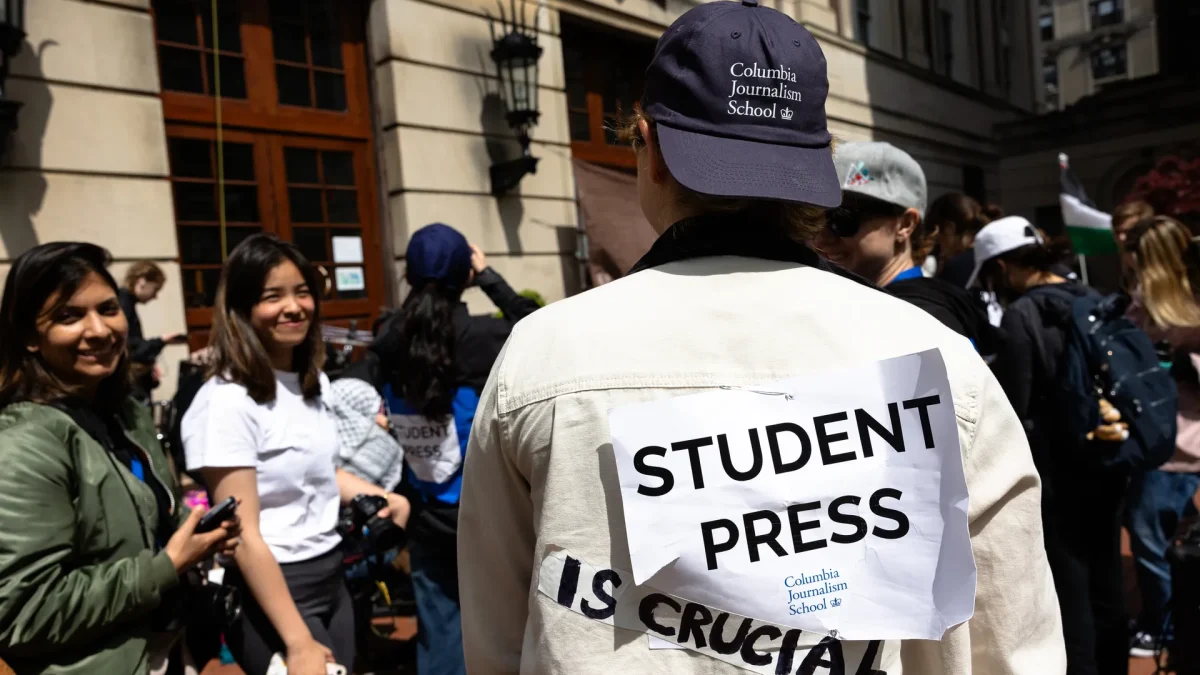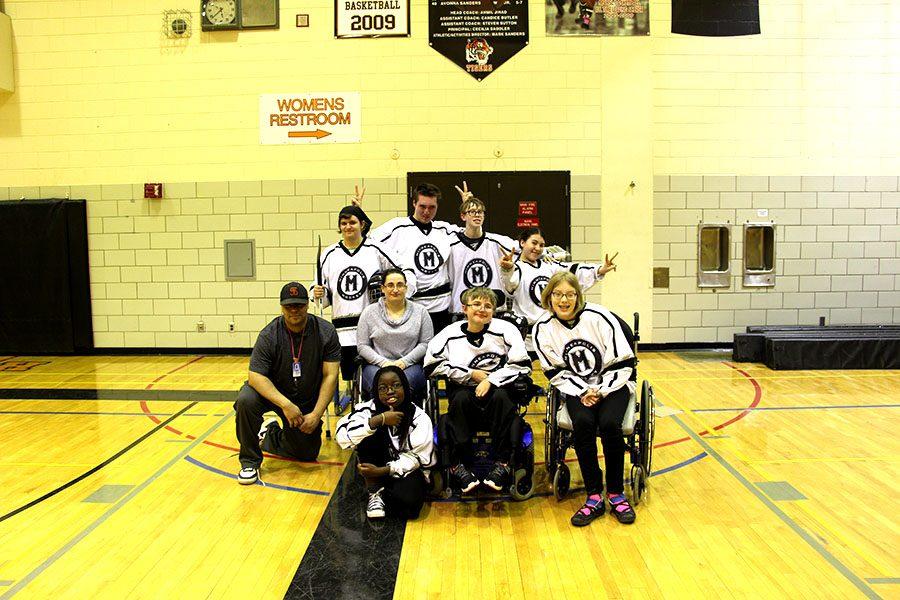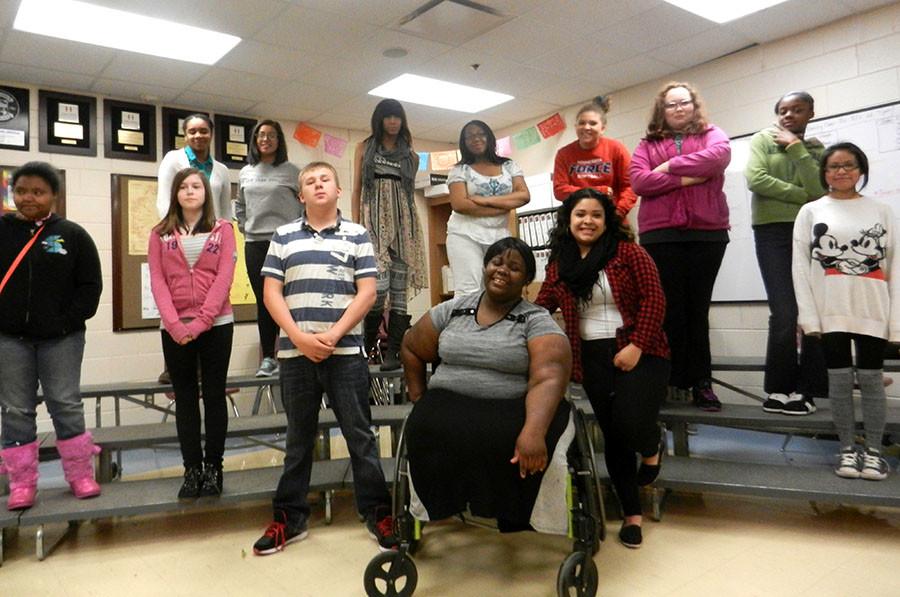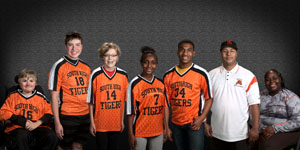On December 30th 2011, sophomore Jack Jablonski of Benilde-St.Margret’s suffered a serious injury while playing hockey. Jablonski was checked into the sideboards from behind, injuring his spinal cord and rendering him paralyzed. Doctors have said that Jablonski may never be able to walk again, let alone ice skate. But this does not mean that his hockey career has to end. Jabsonski now has a recognized physical impairment, making him eligible to participate in adapted sports.
“My friend and I back in the ‘80s, we took the NCAA hockey rules and we made a separate set of rules that were pertaining to kids in wheelchairs,” said Jim Christy, “and also kids on crutches and who used walkers and the kids who couldn’t carry a stick.”
Christy works at South as a support services facilitator as well as a coach for several adapted sports.
“We allowed them to use their feet to propel the puck forward,” said Christy “in regular hockey its not allowed to kick the puck into the net, you have to use your stick. But if you don’t have a stick, you can’t legally score. That wasn’t fair.”
“By the time that you picked the teams, you knew who was going to win,” said Christy.
Christy worked for approximately a month with his roommate to adjust the NCAA hockey rules for students with disabilities and impairments. After reading, and rereading, and debating both sets of rules multiple times, Christy and his friend approached Ed Prohofsky, Christy’s old gym teacher, with their new rules. Prohofsky was now working at the district level in Minneapolis, as the assistant athletic director.
Not only did Prohofsky play a crucial role in getting the adapted sports league started, he was the one who gave Christy the idea in the first place.
“I was challenged by Prohofsky,” stated Christy, “I asked him one day how come we [students with physical and cognitive impairments] couldn’t play other schools like other kids did. He said ‘I don’t know, that’s a good question, why don’t do you do something about it?’ So my friend and myself, we did.”
When the league was first started, there were only four teams participating. Since then it has nearly tripled in size.
Christy has been coaching for over 20 years, led several adapted teams to state tournaments and was inducted into the Minnesota State High School League’s (MSHSL) Hall of Fame for his contributions to the league.
The adapted sports league is split into two separate divisions, one for players with physical impairments (PI) and the other for players with cognitive impairments (CI). South is the home of Minneapolis’s PI teams, while students eligible for CI sports can play at Roosevelt or Edison. All of the teams are a mix of all genders, grades, and skill levels.
“Some kids have both physical and mental disabilities,” said athletic director Mark Sanders, “if you have down syndrome say, you couldn’t play on our team cause its a CI, as opposed to a physical disability.” Although the rules have been modified to make adapted sports safer and more fair for the players, precautions are made to ensure that all players are in enough physical health to participate, and to make sure that the league is still fair.
“[Players] have to have a physical disability that is recognized as being a physical disability by the MSHSL,” said Sanders “Those would be a traumatic brain injury, a disability such as cerebral palsy, muscular dystrophy, spinal bifida.”
Adapted players are also required to have their doctors consent before joining the teams.
“A lot of [players] can’t compete with a regular sport due to their physical disability,” said Sanders “now we’ve had kids that have been able to do both, they qualify for a physical disability so they could play on our adapted team but are also good enough to play on the regular team.”
Sophomore Tyler Spratt is now a member of strictly adapted sports teams, all of them that are offered at South as a matter of fact, but started his athletic career young, as a player on non-adapted teams.
“[Adapted and non-adapted sports] are basically the same,” said Spratt “except adapted has a lot more strict of rules.”
One rule that players are frequently reminded of is the rule against running, which was put in place so that all players had a fair chance. “We have to stay the speed of a wheelchair,” explained Spratt.
For some, the lack of critical athletic aspects such as running could cut down on the feeling of competition. Both Spratt and sophomore player Zach Saice, however, say that they wouldn’t make any changes to adapted sports. “The way it is right now, it just doesn’t seem like it needs to be changed,” explained Spratt.
Sanders stressed the fact that these stricter rules do not take away any seriousness from the sports. He described the league as “extremely competitive, in some cases I would even say more so [than other sports]. Those guys take it very seriously.”
The sports are taken so seriously that even parents get involved, hoping to ensure the success of their child’s team.
“People questioning whether or not this kid should be on the team because of his disability, because he’s too good,” said Sanders “that’s the calls and emails that I get. Its just like any other sport, if you have a stake in it, its going to be important to you.”
Despite the competitive and exciting nature of adapted sports, the teams frequently lack support and even at times acknowledgement from South students that other teams usually have.
“It’s mostly parent support and teachers who have the kids,” said Londell French, assistant coach of the adapted hockey team. “We don’t get a lot of support from actual South students. We get a few, there may be a couple kids who have made relationships, with mainstream kids, coming out to games,” French continued.
“I think its just because they’re special ed, and there’s still a stigma or whatever,” explained French, “you know, its just that other sports are more exciting or have more popular kids playing.”
Adapted sports are played directly after school, as opposed to in the evenings like other games, which is one thing that Sanders believes to add to the low attendance rates at games.
“Its difficult for a lot of our students to get to because they’re involved in other activities after school as well,” said Sanders “so its just like any sport that we have that takes place right after school, its usually not well attended.”
South students do support the adapted teams by acknowledging their wins and loses, but as Christy puts it, “you can always do more.”
The student attendance of games can mean more than just fewer hands to clap on the stands. For some students, its a matter of pride.
“Some could care less, but [there are some players that] if I didn’t tell you that they had some form of physical disability [you wouldn’t know.]” said French “They kinda get discouraged because nobody comes out to the games. Sometimes they don’t want nobody to come out to the games because they don’t want people to know they’re disabled. Its kind of a catch-22.”
At a recent adapted hockey game, on January 26th, there were only two students in attendance who were not members of a player’s family.
But lack of support isn’t the only problem facing the league.
“I think the coaches and referees forget that this is still high school and that you shouldn’t always play just to win at all costs,” said Christy “I think the coaching has become too competitive and they intimidate the ref until they back off and the kids who are more able bodied take over for the kids who are less.”
Christy pointed out that it was not just the referees who are at fault, but also the coaches and parents who he feels are taking the games too seriously.
“The adults have to remember that they are adults and control themselves,” he concluded.
Not only do adapted sports face some of the same difficulties that all sports do, but they also receive the same benefits. For French, the most important benefit is friendship.
“They bond with each other for life,” said French “I got kids who I started coaching ten years ago, still best of friends. I’ve been invited to weddings with all the kids from the team. They form lifelong friendships.”
French explained that it’s not always possible for these students to form friendships, and that for this reason social skills are his main focus.
“The kids have one more thing to talk about with their friends who didn’t play but also they could talk to their peers in school and be proud that they won or sad that they lost,” agreed Christy “it’s just a good psychological change for the kids who play.”
Outside of bonding with their teammates, the opportunity to be a part of a team has given many of the players and their families the chance to expand their horizons.
“I had a kid a couple years ago, who they said that before he started playing hockey he would just sit around playing video games,” said French “that was tremendous for me, to provide something, a physical activity besides sitting around playing video games.”
French went on to explain that these relationships grown past the playing field, and into their everyday lives.
“They hang out after school, they hang out on the weekend, they go see movies together,” said French, “I think 80% of it is really social.”
“The families get to see their kids in a whole different light and do things that they wouldn’t usually see them do,” said Christy, “such as play well with others, on a team where everyone is pretty equal to everybody else.”
For Saice, however, the best benefit seems to be a matter of confidence. “Mr. French says I’m awesome,” he explained. “I’m awesome,” reassured Saice.
The next step in improving the league is just one small addition.
“Basketball,” said French, “they’ve been asking for basketball.”
Adapted sports offer more than just an opportunity to play
February 14, 2012
Story continues below advertisement




![The South adapted soccer team has faced recent injustice, but nobody seems to acknowledge it. Due to snow being plowed into handicapped parking spots, many parents and players are angry because safety became a major issue when trying to get into the gym for their game. Many people are starting to think that this could be a part of a bigger issue, an issue of injustice and unacceptance within the disability community. “I agree that we [South] are really diverse but when it comes to kids with disabilities, we don’t get much of a chance because people use our disabilities against us and say that we can’t do certain stuff because of what we’re able and not able to do,” said Lamawn Saul, a sophomore on the team.](https://www.shsoutherner.net/wp-content/uploads/2020/03/Adapted-Soccer.jpg)
![Hanna Bolstrom is in mid swing to bat for her softball team.This game was between the South Adapted Softball team and the South Suburban Flyers. This game ended with a tie 0-0. Bolstrom is a senior this year and has won the Athena awards for South high school. She is the happiest girl I know. [Shes] always smiling, always happy, always supportive of her members, [and] just upbeat, said Athletic office manager Lynn Heldt. Photo: Asanti Bekele](https://www.shsoutherner.net/wp-content/uploads/2017/06/Hana.jpg)


